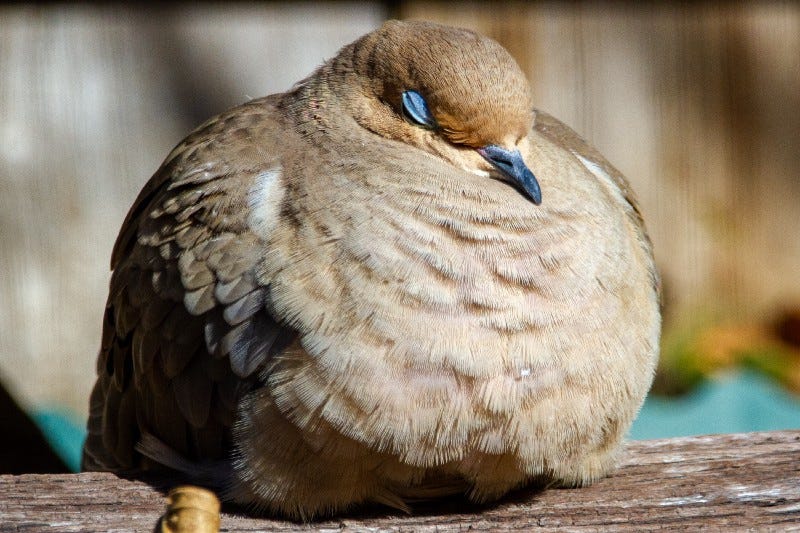Here in the Global North, we have comfortable homes, at least for the material they are built, and where we can sleep comfortably rested. The temperature, sounds, textures, or lighting are adjustable, minimized, and filtered so that we can be and rest as gently as possible.
However, something fascinates me that happened naturally until the middle of the 20th century: napping outside. Not just any nap, but outdoor rest, whether in the city or the countryside, in the forest or on the beach.
These naps fascinate me precisely because they remind us of a place of relaxation and security that we have lost. All the comforts we are surrounded by also separate us, cutting us off from all the dialogues constantly happening around us, whether the voices of rocks or wind, trees or bugs, bacteria or fungi, or even rain and sun.
This natural and ancestral ability to simply rest and sleep at a particular time of day, wherever you are, is now seen through the lens of a society that bases its value exclusively on production, becoming something very negative, lethargy, and laziness that we have to chase away to remain valid actively.
The natural willingness to relax our central nervous system and fall asleep, to the point of passing the dream bubble, touches on several issues. These issues are almost forbidden in the cultural context in which we find ourselves. We have: being a mammal, neglecting sleep, and feeling at home.
We start then with being a mammal. I often tell my daughters that we mammals are naturally lazy. Of course, some people are more active than others, but that’s not what I mean, for I speak of our most intrinsic and fundamental nature, the complex body of bone and flesh that inevitably needs to give itself to the ground, whether in death or in sleep (sleep is also called the little death). However, in modern Western culture, rest is for those who have nothing to do, and we all have a lot to do (and if we don’t, we soon begin to feel shame or guilt). However, for mammals (and most animals), sleeping is essential. It is even part of their most intimate community relationships (those who have pets know what I’m talking about) because they sleep together and are not isolated.
What leads us to neglect sleep makes us ignore the very mystery of life. Rest as superfluous makes us deny the essential threads of our creativity, intuition, and deep relationship with the mystery of things.
So to disregard, that is, to take away agency and sovereignty from sleep, is to neglect ourselves!
Finally, we have the “feeling at home” of finding a safe and secure space to be able to relax and indulge in this brief hibernation that deeply regenerates us. However, until the ’50s of the 20th century, we used to sleep as naturally as the water flowing in the fountains of Rossio Square (Lisbon, Portugal)*; nowadays, this is impossible. Our “home-place”, intimate and safe, has shrunk, getting smaller and smaller. It is dangerous to fall asleep in a city because we can be robbed, and we shouldn’t do that, right?
It is essential to rediscover this comfort outside our most intimate space, to rescue these places of refuge where we can simply close our eyelids for 5 minutes. Furthermore, it is a surrender, an offering to the world.
This poetic ability to sleep beyond our supposedly inviolable walls opens us to the possibilities of profound relationships. It is good to be reminded of the cultural illusions that consciousness or sentience belongs only to humans. Some still believe that humans are the sole observers or narrators of the entire ecosystem around us. It is indeed a huge anthropocentric oversight to think so. The birds, the trees, the rocks, and the streams also observe us. They also sense our presence and interact with us. However, they do not verbally do this, but in a richly sensory way.
So sleeping in nature allows us to submerge deeply into these rich spaces of life, dreaming of them and sleeping enveloped in them, allowing the rich deep hybridization of our psyche and body.
During sleep, be it 5 minutes or 5 hours, we do not interact verbally or rationally with the world. Still, we become immersed with the senses in its mystery, and it is here, in these dreamscapes, and imaginal boundaries, that we are on equal footing with all the other entities, presences, and lives that surround us and relate to us at every moment of our lives.
A nap can be generative and relational, opening deep channels of creativity and surrender. May we surrender to the fertile hybridization of non-verbal dialogues that sustain and engage us, sleeping in resonance rather than isolation.
*This article was inspired by an old book a friend showed me a couple of years ago: a Japanese photographer in the 1950’s went around the world taking pictures of people napping. I’ve been recalling that book ever since.





I would like to see that book!